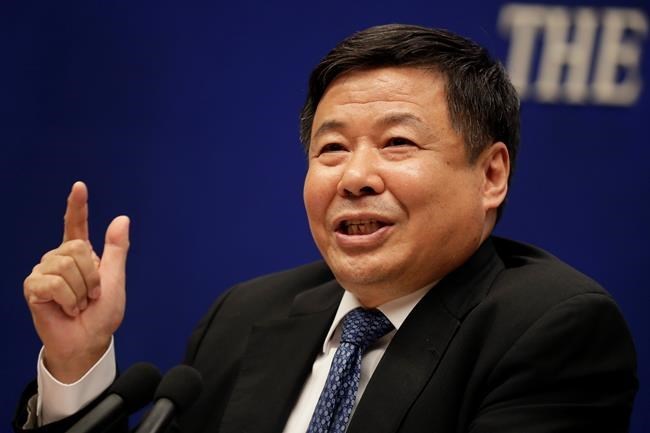
Chinese Finance Vice Minister Zhu Guangyao speaks during a press conference on Sino-US trade issues at the State Council Information Office in Beijing, Wednesday, April 4, 2018. China on Wednesday, April 4, 2018, vowed to take measures of the "same strength" in response to a proposed U.S. tariff hike on $50 billion worth of Chinese goods in a spiraling dispute over technology policy that has fueled fears it might set back a global economic recovery. (AP Photo/Andy Wong)
April 04, 2018 - 3:29 AM
Beijing has announced a $50 billion list of U.S. goods for possible tariff hikes in a spiraling technology dispute with Washington.
That followed the release of a U.S. government list of Chinese goods targeted for punitive tariffs in response to complaints Beijing pressures foreign companies to hand over technology.
On Monday, China raised duties on $3 billion of U.S. pork apples, and other goods in response to higher American import duties on steel and aluminum.
The issues at stake:
___
Q: WHY DID THIS DISPUTE BLOW UP?
A: President Donald Trump says Beijing is violating its free-trade commitments by pressuring foreign companies to hand over technology to potential Chinese competitors in exchange for market access.
Trump has pledged to narrow the U.S. trade deficit with China, which Washington put at $375.2 billion last year, a record for any country.
A key irritant is Beijing's long-range industry plan, dubbed "Made in China 2025," which calls for creating Chinese global leaders in electric cars, robotics and other fields. Foreign companies complain that will limit or outright block their access to those industries.
___
Q: WHAT HAVE THE TWO SIDES DONE SO FAR?
A: Trump approved tariff increases on steel and aluminum imports in response to complaints American suppliers were threatened by unfairly low-priced imports.
The United States buys little steel and aluminum from China, but analysts said Beijing felt compelled to respond, partly as a "warning shot" ahead of an expected fight over technology.
On Monday, China raised duties on pork and aluminum scrap by 25 per cent and on apples, sparkling wine, steel pipes and other goods by 15 per cent. The measures appeared to target farm states that voted for Trump in 2016.
___
Q: WHAT IS AT STAKE?
A: The United States and China have the world's biggest trading relationship. That gives them an incentive to reach a settlement to avoid damaging many businesses on both sides.
Exports to China directly or indirectly supported 1.8 million new U.S. jobs in 2015, according to the U.S.-China Business Council, an industry group.
Wednesday's Chinese tariff hike targeted goods including soybeans, the biggest U.S. export to China, and aircraft.
Economists and investors worry other governments might respond by raising their own import barriers. That might chill commerce and set back a global economic recovery.
___
Q: WHY DOES TECHNOLOGY MATTER?
A: The latest tariff dispute strikes at the heart of technology industries China's leaders consider vital for its economic future.
Chinese factories assemble most of the world's smartphones, computers and consumer electronics. But Beijing wants to capture more of the profits by becoming a creator of technology instead of a low-cost factory.
The ruling Communist Party is spending heavily and pressing foreign companies for help in developing Chinese global competitors in telecoms, electric cars and other technologies.
Washington is trying to promote technology exports to offset its imports from China and support higher-paying jobs.
American and other foreign companies have long complained about Chinese rules that require automakers and others to work through local partners, compelling them to share technology with potential competitors.
Last month, Washington filed a World Trade Organization complaint over Chinese policy it said limits the ability of foreign companies to control and profit from their technology.
___
Q: WHAT'S LIKELY TO COME NEXT?
A: Chinese officials have acknowledged their country has more to lose in a full-blown conflict with Washington but say they will endure the cost.
Beijing has options for retaliating against U.S. companies operating in China. Regulators could withhold licenses or alter other conditions to hamper foreign business activity.
Some economists have suggested Washington could target state-owned enterprises that dominate industries including energy, telecoms and banking.
Europe and Japan also have grumbled about the monopolies and other privileges given to SOEs. Washington may try to get them to jointly pressure Beijing for change.
News from © The Associated Press, 2018